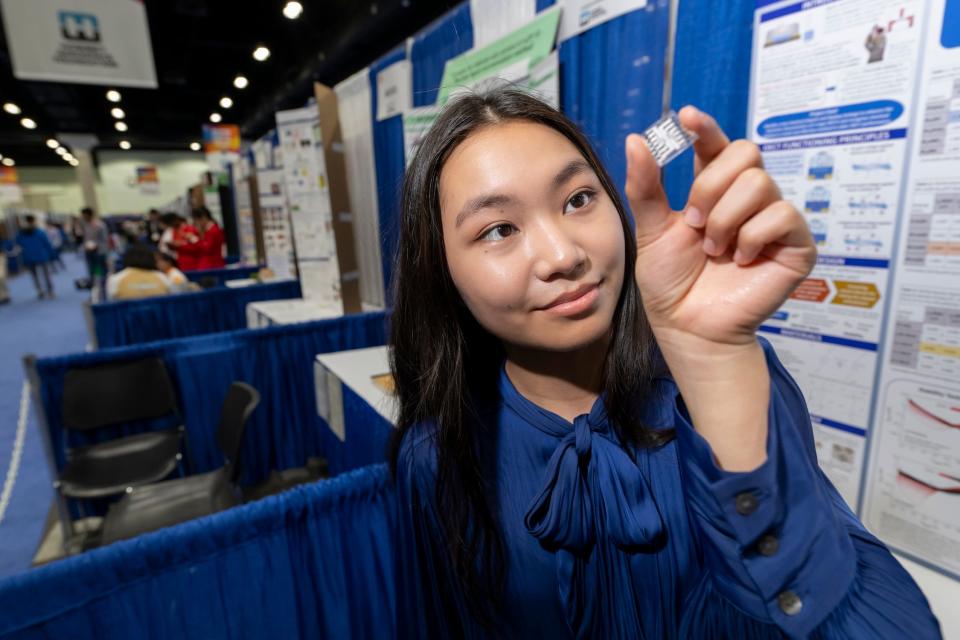The CEO behind the world's biggest science and engineering fair says the biggest mistake parents make is putting too much pressure on their kids
The Regeneron ISEF is a huge science fair that attracts top talent from all over the world.
This year, the competition awarded $9 million in prizes. It has a history of prestigious winners.
That can make for a stressful competition, but parents shouldn't add to it, CEO Maya Ajmera said.
What's been called the "granddaddy" of science fairs took place last week.
With over $9 million in prizes and heaps of prestige, the Regeneron International Science and Engineering Fair (ISEF) attracts some of the best and brightest students from around the world, like Hawaii and California as well as Kildare, Ireland and Shanghai, China.
Past winners include Nobel Prize recipients, Rhodes Scholars, and MacArthur Foundation genius grant awardees.
With that kind of money and acclaim on the line, it's not surprising that the atmosphere surrounding the competition is intense.
"I think a lot of kids who are here actually — I don't think I'm reading it wrong — are truly excited to be here," said Maya Ajmera, the president and CEO of the Society for Science, which coordinates ISEF. "But they also feel the pressure of wanting to win and the pressure of going to college," she told Business Insider last week.
The biggest mistake that parents with ambitious, curious kids can make is adding to that pressure, she said.
Besides, between addictive social media, the climate crisis, growing up during the pandemic, and feeling lonelier than ever, Gen Z already has more than enough sources of anxiety.
Stepping back and letting the kids do the work

While it can be useful to have a parent invested in helping their kid meet deadlines and make a nice-looking poster, some adults take it too far. Ajmera advises parents to "stand back and let your kid do it."
"Get out of their way," she said, "and don't pressure them too much."
If competing at ISEF is any indication of success, then Ajmera's advice certainly seems to work. Parents of ISEF competitors who spoke with Business Insider shared her philosophy.
"We never pressure them," Maria Estrada, whose two children have both competed and won awards at ISEF, told Business Insider. Estrada said she's never expected her children to have 5.0 GPAs, and that she's even asked her daughter to slow down and be a kid.
"I accepted my kids for who they are," she added. "I think it's important for parents to know their kids' abilities."
Another parent, Alexa Groff, has a daughter, Taylor, who competes in science fairs and is a competitive dancer. She said that a friend recently told her she'd expected Groff to be an intense "dance mom" who showed up early to everything.
In reality, the friend told her she was "super-duper chill."
"I think it's important for Taylor to explore her passions without my hand in it," Groff said. When her daughter wanted to quit volleyball, for example, she said she let it happen and supported the decision."I want her to figure things out on her own, but know that I'm there for whatever she needs me for," Groff said.
Combining passion and hard work to solve problems
As part of the ISEF competition, nearly 2,000 students from 49 states and 70 countries gathered in Los Angeles to showcase their research to judges. ISEF pulls the finalists from 400 smaller science fairs from around the world, taking the winners from a pool of 175,000 competitors.
While not typically at the same level as peer-reviewed scientific research, ISEF students' topics can be as sophisticated as microbial genetics, bone tumors, and microplastic filtration.
Far from overly involving themselves, parents are often surprised at what their children accomplish with their projects. "They're kind of amazed, actually," Ajmera said.
Students are often inspired to pursue these difficult subjects because of real-world issues and not by their parents' insistence to compete, Ajmera said.
"A lot of kids have their own personal stories to share of something that's affected their families or their communities, and they want to go in and solve it," Ajmera said of the Gen Z competitors.
For example, 18-year-old Maddux Alexander Springer received this year's $10,000 Peggy Scripps Award for Science Communication for his studies on a tumor-causing disease in green sea turtles near his home in Hawaii.

That kind of interest and enthusiasm can carry a student far, which is important since most winning projects are often complex and time-consuming.
For example, 16-year-old Grace Sun won this year's top prize, the $75,000 George D. Yancopoulos Innovator Award, for her project on organic electronic devices. Sun told Business Insider she had to miss hours of school to work in a university lab for her project.
For some kids, though, it's all worth it because the time and effort are investments in what they hope will be their future careers.
"A lot of these kids are going to either land in academia doing research, or they're going to be entrepreneurs and start new companies on the new cutting-edge technologies," Ajmera said.
Read the original article on Business Insider

